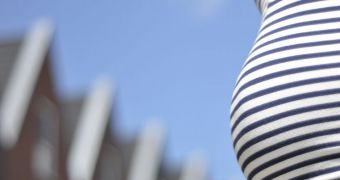experts have determined that expecting mothers who do not consume sufficiently large amounts of iron during the early stages of pregnancy tend to have children with reduced weight.
According to the group, the early pregnancy is a critically-important stage in the life of an embryo. It is believed that iron helps the new child grow healthy inside their mother's womb.
Details of the new conclusions were published in the latest issue of the medical journal Human Reproduction. The investigation on which they are based was conducted on 1,300 pregnant women.
One of the main conclusions was that would-be mothers who consumed extra iron, from either food or dietary supplements, tended to have bigger babies at the end of their pregnancies.
The results were even better from women who consumed sufficient amounts of both iron and vitamin C. The latter has been proven in past works to boost the absorption rate of iron originating in non-meat sources, the University of Leeds team explains.
A large percentage of women who become pregnant do not ensure that they are consuming the necessary amounts of iron, and so this is a global public health problem now, the experts add.
“Pregnancy places stress on the body and women may need to make changes to their diet to meet the increased demand for iron,” suggests UL Nutritional Epidemiology Group expert Dr Nisreen Alwan.
“Our study shows that the majority of pregnant women are not meeting the iron intake recommendations for women of childbearing age in the UK,” adds the expert, the lead author of the new investigation.
“Our study shows that expectant mums with higher intake of iron in early pregnancy tended to have bigger babies. This relationship was stronger in women with higher intakes of vitamin C,” the scientist goes on to say.
“Foods rich in iron are particularly important for vegetarians, who do not eat any of the readily-absorbed form of iron found in meat,” Alwan adds. Common side-effects of not consuming enough iron include low birth-weight, premature birth and impaired neurological development.
Here is a basic list of iron-rich foods:
1.Lentils 2.Beans, such as canned beans, black beans and soybeans 3.Dark green leafy vegetables such as spinach 4.Fortified bread and breakfast cereals 5.Pumpkin seeds 6.Tofu 7.Meats, in particular red meat and prawns.
Iron absorption rates can be boosted by consuming vitamin C from fruits, especially citrus fruits.

 14 DAY TRIAL //
14 DAY TRIAL //